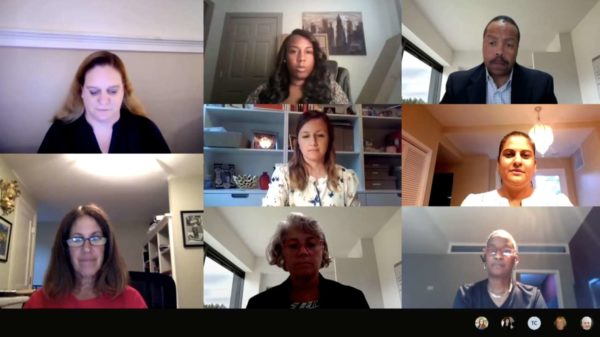Arlington County’s new police practices review board answered questions from the public about its goals and methods in a virtual meeting Monday.
The board, announced in July by County Manager Mark Schwartz, used the meeting to elaborate on how it would “ensure that the Arlington County Police Department is current with policing best practices and continue to build trust between our police and the community” through its review.
Its work comes in the wake of increased community complaints about ACPD, local activists’ recent demands for police reform and a national reckoning on policing after George Floyd’s killing by police.
Questions were directed at representatives of the review board’s two parts: an external assessment of ACPD by a hired firm, and a 16 person Police Practices Group (PPG) with four subcommittees.
Marcia Thompson, a civil rights attorney and vice president of law enforcement consulting at Hillard Heintze, is leading her firm’s ACPD assessment.
When asked how Hillard Heintze will conduct its review, Thompson said it will first comb through ACPD data to compile a quantitative report on policies and practices like use of force. The firm will then create a qualitative report based on a climate survey and interviews with police officers and community members who have relevant lived experience.
Thompson said the firm will compare its findings to what are considered best practices for community policing, a standard set by the U.S. Department of Justice and policing accreditation groups like CALEA.
She added that reviews like this are typically asked for by police departments dealing with a publicized incident or failure, but she does not think similar pressure compelled Arlington.
“This is a progressive move by a department to actually have someone coming in and look at their practices,” Thompson said. “They have no idea what our outcomes are going to be, so that’s a very bold step that they took to have someone come in to look at their work.”
The remainder of the community’s questions were about the PPG, whose members are largely Arlington-based. The group consists of four subcommittees, with each looking at an ACPD policy area.
“Our end goal is to be able to take the assessment work that [Thompson] and her team are doing and combine it with community engagement work that the PPG group is doing, to present a set of recommendations to the County Manager by the middle of December,” Julie Shedd, the associate dean at George Mason University’s Carter School for Peace and Conflict Resolution and the PPG’s expert consultant, said.
Each subcommittee chair spoke in the meeting about what their intentions are and methods of analysis will be.
The mental health subcommittee is chaired by Naomi Verdugo, a member of the Arlington Mental Health and Disability Alliance.
Verdugo said she wants to focus on “alternatives to police or different ways police can respond to people in psychiatric crisis.” The subcommittee will look at options like having a co-responder program to improve the way ACPD handles mental health-related situations.
Allison Carpenter is the chair of the traffic enforcement subcommittee. She said it will analyze ACPD traffic stop statistics to identify ratios and trends, then address any disparities that are discovered.
“Part of our task is not to just look at data that’s been crunched for us but to ask the difficult questions of can we look at this sort of thing,” Carpenter said. “Can we calculate a ratio based on who’s getting stopped and then where those stops lead? How many people do we ask, for example, to search? How many of those searches result in contraband?”
The alternative dispute resolutions subcommittee will look at different strategies to traditional policing. Devanshi Patel, the subgroup’s chair, said methods like mediation and restorative justice will be looked at in the context of how they could be applied in Arlington.
The county’s Restorative Arlington group is also looking at restorative justice in this context.
Rodney Turner is the civilian review board subcommittee chair. He said the subgroup will consider different types of civilian review boards and recommend which would best fit Arlington.
“We will look at various models that will look at the issues of transparency, authority that a civilian review board has, whether it can do its own investigations or whether it is authorized to do its own investigations, to see what works with our community,” Turner said.
Upcoming PPG meetings with public comment are below.
- September 14, 4 p.m.: Policing and Mental Health
- September 28, 4 p.m.: Alternative dispute resolution
- October 12, 4 p.m.: Civilian Review Board
- October 26, 4 p.m.: Traffic and Policing
Image via Arlington County


